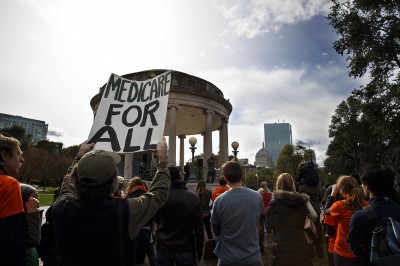
Armed with signs and chants, upwards of 200 people gathered at the Boston Common Sunday morning to advocate for national and global health care reform.
The protesters called upon legislators, both local and international, to provide universal healthcare worldwide. The goal for the event was twofold, volunteer coordinator and Northeastern University student, Matthew Zinck said.
“Locally, we’re calling for the gubernatorial candidates to add single-payer health care to their platform,” Zinck said. “And then globally, we’re calling for the creation of a $20 billion global health emergency fund to respond to the Ebola epidemic, to ensure that we have this fund to prevent future outbreaks from occurring.”
Single-payer health care would guarantee universal health care coverage from birth to death for Massachusetts residents, and only one agency would pay medical bills and collect funds through taxes, according to a flyer distributed at the rally by Mass-Care , the Massachusetts Campaign for Single Payer Health Care.
“Single-payer health care is not new. Medicare is a single-payer health system, so we’re just calling for an expansion of Medicare for all people,” Zinck said.
The protesters called for the legislative support of Article 25 of The Universal Declaration of Human Rights , which was established in 1948, after the Holocaust.
“Today we just really want to get some petitions signed, to send to the state government in Massachusetts, and just let them know that this is something we want to be on their radar,” said Matthew Erdos, an executive board member of Boston University’s Partners in Health Engage and a junior in the College of Arts and Sciences.
In addition to signing petitions, protesters created posters and marched around the Common, where they gathered on the steps near the Massachusetts State House in solidarity of their cause. From there, the crowd returned to the Parkman Bandstand and cheered as speakers advocated for the importance of spreading health care reform to lawmakers.
“It’s really important these days to talk to your senators to make sure they understand that this is a priority through this next session,” said Ture Turnbull , executive director of Mass-Care , the state’s leading single-payer health care reform group. “We’re the leaders. Massachusetts should be leading the nation in health care reform. That’s why we’re looking very closely to the 2015-16 [legislative] session, what can we do to make this pass.”
Other speakers included Joia Mukherjee , associate professor at Brigham and Women’s Hospital and Chief Medical Officer of Partners in Health, Brook Baker , and Don Berwick, Northeastern University law professor and former Massachusetts gubernatorial candidate.
“[We need] an organized and educated populace that’s willing to fight together. That’s the only way to make real political change,” Mukherjee said. “These are basic human rights and people should not have to beg for a basic human right. We shouldn’t have to beg, but we do have to fight.”
Berwick riled up the crowd to work together to speak out against these kinds of injustices.
“When we have a health care system that makes sense, that’s reorganized around the real needs of real people and real communities and real causes, we will have a health care system that meets needs better, saves more lives, adds to the health of the population and reduces costs substantially,” he said. “That is within our grasps.”
University students from around the city, many with medical backgrounds, attended the event. Krishna Prabhu , a Harvard Medical School student, said universal health care is an unalienable right, as is stated in the UDHR.
“It’s a fundamental freedom-enhancing service,” Prabhu said. “It’s unlike cars and clothes and other products. It’s something that enhances our capability, so it’s fundamental to our human existence. That’s why I support health care access for all.”
Vanessa Yu , a Tufts University sophomore, said she supports the reform but wanted to learn more about the cause.
“Education is the big thing,” Yu said. “ A lot of people don’t know what Article 25 is, even I’m not totally clear on the whole thing, which is why I came to the event to learn what it’s about and how I can get involved and help.”
Boston College junior, Nate Osborne said he is optimistic about the future of health care reform.
“The more centralized the policy is, the less private competition there is, the better the coverage will be, the cheaper it will be, the better health care will be,” he said.





The authors of this article should learn something about Medicare. Medicare is not a single payer insurance system. It is nothing like the law proposed by MassCare for Massachusetts